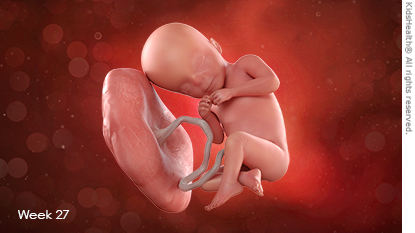Pregnancy at 27 Weeks: Weekly Calendar
Your Baby’s Development at 27 Weeks
What Are My Baby’s Weight and Size at 27 Weeks?
Babies at this stage look like how they’ll appear at birth, just thinner and smaller. When you’re 27 weeks pregnant, your baby likely weighs about 2¼ pounds (1 kg) and is about 13 ¾ inches (35 cm) long. Babies keep gaining weight steadily over the next 13 weeks until birth.
Week 27 is the last week of the second trimester (weeks 14–27).
Development Milestones at 27 Weeks
With a 27-week-old fetus, parts of the body — like the lungs, liver, and — still need to fully mature, but if born now, your baby would have a good chance of surviving.
As hearing continues to develop, your baby may start to recognize your voice and your partner's voice. Sounds may be muffled, though, because they have to travel through the uterus (womb) and amniotic fluid before reaching the ears. Amniotic fluid is the liquid the baby floats in within the amniotic sac.

Your Body When You’re 27 Weeks Pregnant
At this point in your pregnancy, your body continues to protect and nourish your baby.
Pregnancy Symptoms at 27 Weeks
When you're 27 weeks pregnant, you’re likely feeling your baby moving a lot more in your belly than before. You might also feel your baby hiccupping. All babies move in different ways. If you're worried or notice less movement, talk with your doctor.
As your baby grows, your uterus pushes on your intestines. This and hormones may make you constipated (have trouble pooping) and bloated. It may help to drink plenty of water and eat foods with fiber, like fruits, vegetables, whole grains, and beans.
You might also be having other types of discomfort, so ask your doctor for tips on how to ease your symptoms.
Standard Appointments at 27 Weeks
Week 27 is the end of the second trimester, and if you haven’t had prenatal tests in this part of your pregnancy yet, your doctor can still offer them to you. They might include a glucose screening to look for gestational diabetes, a short-term form of diabetes that may happen pregnancy. Your doctor may also suggest an ultrasound (or sonogram). This test uses sound waves to make pictures that show the baby's shape and position in the uterus.
As your pregnancy goes on, you’ll likely have doctor visits every few weeks. You can expect your doctor to offer more prenatal tests in the third trimester (weeks 28–40).
How Can I Prepare for My Baby’s Arrival?
At this point in your pregnancy, sign up for childbirth and newborn care classes through your local community center or hospital to learn about things like:
- labor and options for pain relief
- what to expect after delivery
- breastfeeding and formula feeding
- medical care and your newborn
- babyproofing your home
- infant CPR
Finding out all you can about birth and babies will help you feel more confident, especially if you're a first-time parent.


 Note: All information is for educational purposes only. For specific medical advice,
diagnoses, and treatment, consult your doctor.
Note: All information is for educational purposes only. For specific medical advice,
diagnoses, and treatment, consult your doctor.